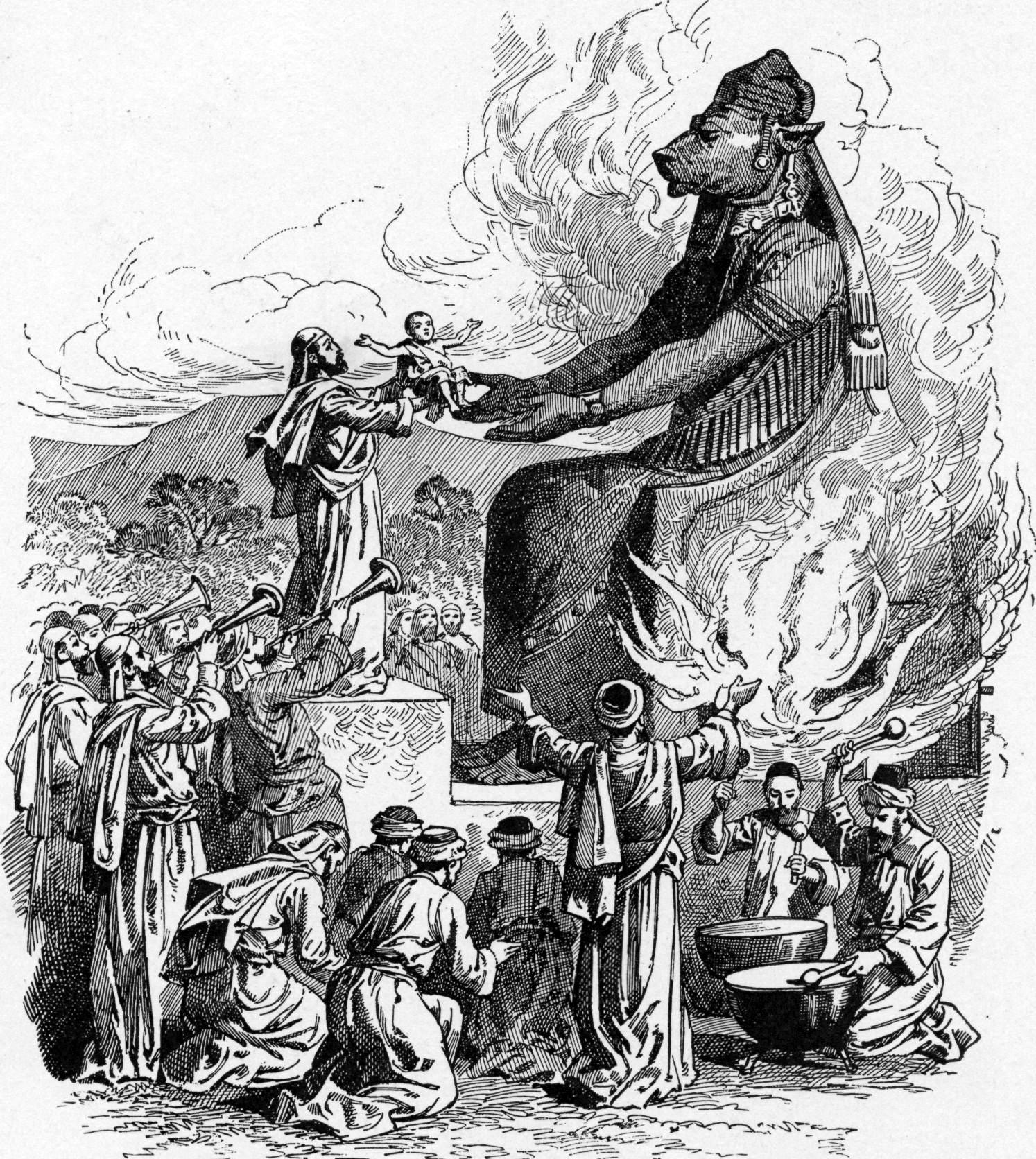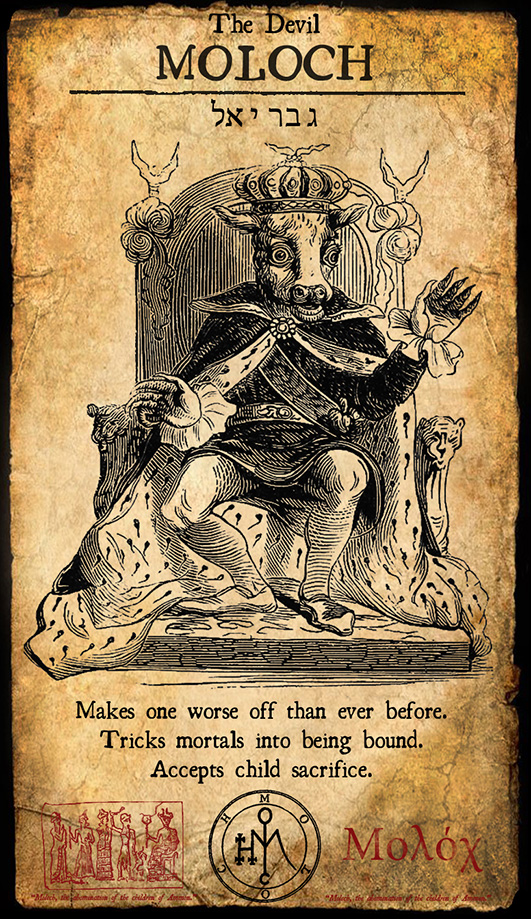Difference between revisions of "Moloch"
Occultwiki (talk | contribs) |
Occultwiki (talk | contribs) |
||
| (3 intermediate revisions by the same user not shown) | |||
| Line 7: | Line 7: | ||
The word Moloch occurs 8 times in the Masoretic text of the Hebrew Bible; in one of these instances (1 Kings 11:7) it is possibly a mistake for Milcom, the god of the Ammonites. Five of the other references are in Leviticus, with one in 2 Kings and another in The Book of Jeremiah. Each mention of Moloch indicates the presence of the article ''ha''-, or "the", therefore reading "the Moloch." Likewise, when passages describe things coming or going "to Moloch," the prepositional ''lamedh'' is conjugated with a ''patach'' (la-Mōleḵ) to match the form of "...to the Moloch." | The word Moloch occurs 8 times in the Masoretic text of the Hebrew Bible; in one of these instances (1 Kings 11:7) it is possibly a mistake for Milcom, the god of the Ammonites. Five of the other references are in Leviticus, with one in 2 Kings and another in The Book of Jeremiah. Each mention of Moloch indicates the presence of the article ''ha''-, or "the", therefore reading "the Moloch." Likewise, when passages describe things coming or going "to Moloch," the prepositional ''lamedh'' is conjugated with a ''patach'' (la-Mōleḵ) to match the form of "...to the Moloch." | ||
All of these texts condemn Israelites who engage in practices associated with Moloch, and most associate Moloch with the use of children as offerings. The activity of causing children "to pass over the fire" is mentioned, without reference to Moloch, in numerous other verses of the Bible. Leviticus repeatedly forbids the practice of offering children to Moloch in (Leviticus 18:21 and Leviticus 20:2–5). | All of these texts condemn Israelites who engage in practices associated with Moloch, and most associate Moloch with the use of children as offerings. The activity of causing children "to pass over the fire" is mentioned, without reference to Moloch, in numerous other verses of the [[Bible]]. Leviticus repeatedly forbids the practice of offering children to Moloch in (Leviticus 18:21 and Leviticus 20:2–5). | ||
===Septuagint and New Testament=== | ===Septuagint and New Testament=== | ||
| Line 20: | Line 20: | ||
==As a rite of passage== | ==As a rite of passage== | ||
The notion that Moloch refers to a deity has been challenged for several reasons. Moloch is rarely mentioned in the Bible, is not mentioned at all outside of it, and connections to other deities with similar names are uncertain. | The notion that Moloch refers to a deity has been challenged for several reasons. Moloch is rarely mentioned in the [[Bible]], is not mentioned at all outside of it, and connections to other deities with similar names are uncertain. | ||
A minority of scholars, mainly scholars of Punic studies, have argued that the ceremonies to Moloch are in fact a non-lethal dedication ceremony rather than a sacrifice. These theories are partially supported by commentary in the Talmud and among early [[Judaism|Jewish]] commentators of the [[Bible]]. Rejecting such arguments, Paolo Xella and Francesca Stavrakopoulou note that the Bible explicitly connects the ritual to Moloch at the tophet with the verbs indicating slaughter, killing in sacrifice, deities "eating" the children, and holocaust. Xella also refers to Carthaginian and Phoenician child sacrifice found referenced in Greco-Roman sources. | A minority of scholars, mainly scholars of Punic studies, have argued that the ceremonies to Moloch are in fact a non-lethal dedication ceremony rather than a sacrifice. These theories are partially supported by commentary in the Talmud and among early [[Judaism|Jewish]] commentators of the [[Bible]]. Rejecting such arguments, Paolo Xella and Francesca Stavrakopoulou note that the Bible explicitly connects the ritual to Moloch at the tophet with the verbs indicating slaughter, killing in sacrifice, deities "eating" the children, and holocaust. Xella also refers to Carthaginian and Phoenician child sacrifice found referenced in Greco-Roman sources. | ||
| Line 31: | Line 31: | ||
==Occult significance== | ==Occult significance== | ||
Éliphas Lévi's Conjuration of the Seven, an invocation used to consecrate a talisman, includes a banishing of Moloch: "By the holy Elolm and by the names of the ''genii'' Cassiel, Sebaltiel, Aphiel and Zarabiel, at the command of Orifiel, depart from us, Moloch! We deny thee our children to devour." He believed Moloch and Bael were personifications of [[Yahweh]] which had been dishonoured by barbarous attributes. | [[Éliphas Lévi]]'s ''[[Conjuration of the Seven]]'', an invocation used to consecrate a [[talisman]], includes a banishing of Moloch: "By the holy Elolm and by the names of the ''genii'' [[Cassiel]], Sebaltiel, Aphiel and Zarabiel, at the command of Orifiel, depart from us, Moloch! We deny thee our children to devour." He believed Moloch and [[Bael]] were personifications of [[Yahweh]] which had been dishonoured by barbarous attributes. | ||
In the ''[[Testament of Solomon]]'', [[King Solomon]] falls from [[Judaism]] when he becomes enamoured by a Shunammite woman and sacrifices five grasshoppers to Moloch on the advice of Moloch's priests. In the depression that follows, he builds temples to Bael, Raphan, and Moloch. | In the ''[[Testament of Solomon]]'', [[King Solomon]] falls from [[Judaism]] when he becomes enamoured by a Shunammite woman and sacrifices five grasshoppers to Moloch on the advice of Moloch's priests. In the depression that follows, he builds temples to [[Bael]], Raphan, and Moloch. | ||
In [[Kabbalah]], Moloch (alongside [[Satan]]) is the [[demon]] ruler over the [[qlippoth]] of [[Thaumiel]] on the [[Tree of Death]]. | |||
Moloch was a King of Edom, ruling as prince over the third kingdom. | Moloch was a King of Edom, ruling as prince over the third kingdom. | ||
Latest revision as of 18:30, 19 December 2024
Moloch (Biblical Hebrew: מֹלֶךְ or הַמֹּלֶךְ Ancient Greek: Μόλοχ, Latin: Moloch or Molech) is a name which appears in the Hebrew Bible several times, primarily in the book of Leviticus. The Bible strongly condemns spiritual practices associated with Moloch, practices which appear to have included child sacrifice.
Traditionally, the name Moloch has been understood as referring to a specific Canaanite god. However, since 1935, scholars have debated whether or not the term refers to a type of child sacrifice on the basis of a similar term, also spelled mlk, which means "sacrifice" in the Punic language.
Biblical references
The word Moloch occurs 8 times in the Masoretic text of the Hebrew Bible; in one of these instances (1 Kings 11:7) it is possibly a mistake for Milcom, the god of the Ammonites. Five of the other references are in Leviticus, with one in 2 Kings and another in The Book of Jeremiah. Each mention of Moloch indicates the presence of the article ha-, or "the", therefore reading "the Moloch." Likewise, when passages describe things coming or going "to Moloch," the prepositional lamedh is conjugated with a patach (la-Mōleḵ) to match the form of "...to the Moloch."
All of these texts condemn Israelites who engage in practices associated with Moloch, and most associate Moloch with the use of children as offerings. The activity of causing children "to pass over the fire" is mentioned, without reference to Moloch, in numerous other verses of the Bible. Leviticus repeatedly forbids the practice of offering children to Moloch in (Leviticus 18:21 and Leviticus 20:2–5).
Septuagint and New Testament
The Greek Septuagint translates the instances of Moloch in Leviticus as "ruler" (ἄρχων), and as "king" (βασιλεύς) at 1 Kings 11:7. It contains Moloch at 2 Kings 23:10 and Jeremiah 30:35. Additionally, the Septuagint uses the name Moloch in Amos where it is not found in the Masoretic text: "You even took up the tent of Moloch and the star of your god Raiphan, models of them which you made for yourselves." (Amos 5:26, cf. Masoretic Amos 5:26)
The Greek version with Moloch is quoted in the New Testament and accounts for the one occurrence of Moloch there (Acts 7:43).
Moloch the deity
Moloch was a pagan deity, to whom child sacrifice was offered at the Jerusalem tophet. The medieval rabbinical tradition understood Moloch as closely related to other similarly named deities mentioned in the Bible such as Milcom, Adrammelek, and Anammelech. The medieval rabbinical tradition also connected Moloch to reports of ancient Phoenician and Carthaginian child sacrifice; both of these rabbinical ideas were taken over by early modern scholarship. Some modern scholars have proposed that Moloch may be the same god as Milcom, Adad-Milki, or an epithet for Bael.
Moloch may be connected with a deity Mlk, a Mesopotamian a god of the underworld, although this god appears to have only received animal sacrifice. Moreover, it is possible that some of the supposed deities named Mlk are epithets for another god, given that mlk can also mean "king." The Israelite rite conforms, on the other hand, to the Punic mlk rite in that both involved the sacrifice of children.
As a rite of passage
The notion that Moloch refers to a deity has been challenged for several reasons. Moloch is rarely mentioned in the Bible, is not mentioned at all outside of it, and connections to other deities with similar names are uncertain.
A minority of scholars, mainly scholars of Punic studies, have argued that the ceremonies to Moloch are in fact a non-lethal dedication ceremony rather than a sacrifice. These theories are partially supported by commentary in the Talmud and among early Jewish commentators of the Bible. Rejecting such arguments, Paolo Xella and Francesca Stavrakopoulou note that the Bible explicitly connects the ritual to Moloch at the tophet with the verbs indicating slaughter, killing in sacrifice, deities "eating" the children, and holocaust. Xella also refers to Carthaginian and Phoenician child sacrifice found referenced in Greco-Roman sources.
Portrayal
Medieval and modern sources tend to portray Moloch as a bull-headed humanoid idol with arms outstretched over a fire, onto which the sacrificial child is placed. This portrayal can be traced back to medieval Jewish commentaries, which connected the biblical Moloch with depictions of Carthaginian sacrifice to Cronus (Baal Hammon) found in sources such as Diodorus, with George Foote Moore suggesting that the bull's head may derive from the mythological Minotaur. John S. Rundin suggests that further sources for the image are the legend of Talos and the brazen bull built for king Phalaris of the Greek city of Acragas on Sicily. He notes that both legends, as well as that of the Minotaur, have potential associations with Semitic child sacrifice.
Milton's Paradise Lost lists Moloch among the chief of Satan's angels in Book I, and is given a speech at the parliament of Hell in Book 2:43–105, where he argues for immediate warfare against God. He later becomes revered as a pagan god on Earth.
Occult significance
Éliphas Lévi's Conjuration of the Seven, an invocation used to consecrate a talisman, includes a banishing of Moloch: "By the holy Elolm and by the names of the genii Cassiel, Sebaltiel, Aphiel and Zarabiel, at the command of Orifiel, depart from us, Moloch! We deny thee our children to devour." He believed Moloch and Bael were personifications of Yahweh which had been dishonoured by barbarous attributes.
In the Testament of Solomon, King Solomon falls from Judaism when he becomes enamoured by a Shunammite woman and sacrifices five grasshoppers to Moloch on the advice of Moloch's priests. In the depression that follows, he builds temples to Bael, Raphan, and Moloch.
In Kabbalah, Moloch (alongside Satan) is the demon ruler over the qlippoth of Thaumiel on the Tree of Death.
Moloch was a King of Edom, ruling as prince over the third kingdom.
In the Occult Tarot and The Demon-Possessed Tarot, Moloch is portrayed as The Devil. His office is to make a person worse off than ever before, and tricking mortals into being bound. He also accepts child sacrifice.

